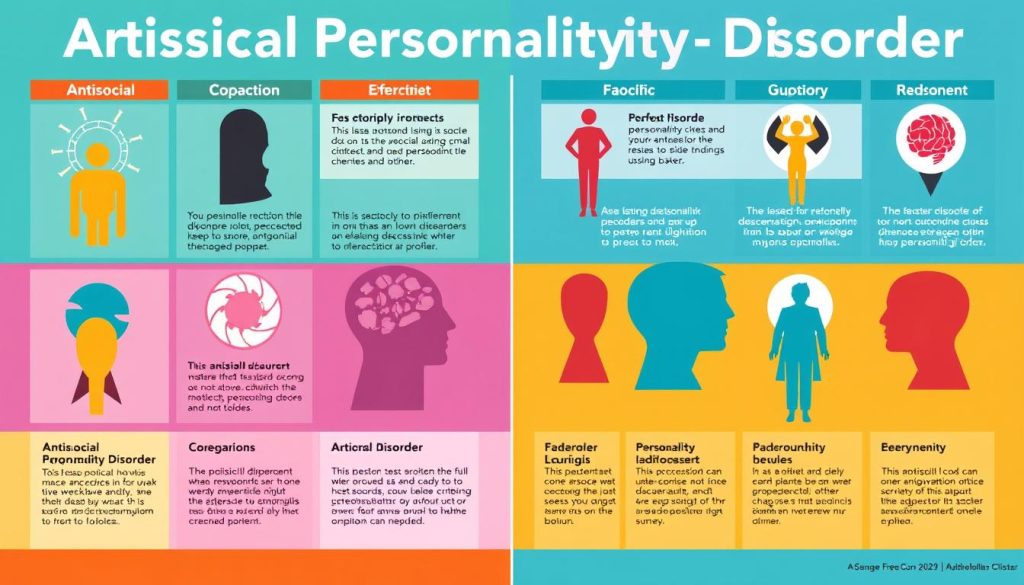Antisocial personality disorder, or ASPD, often goes unnoticed in our fast-paced world. It shows clear symptoms that help us see the challenges people face. This disorder is marked by ignoring social rules and others’ rights, causing big problems in relationships and causing a lot of stress.
The DSM-5 helps doctors spot ASPD by looking at certain behaviors and attitudes. These actions can mess up someone’s life at home, work, and in the community. Knowing how common this disorder is shows we need to talk about it more and find ways to help.
Living in a world that values kindness and teamwork is hard for those with ASPD. So, it’s not just about knowing the symptoms; it’s about understanding and caring for them. We want to help people understand this complex issue with both knowledge and kindness.
Key Takeaways
- Recognizing antisocial personality disorder symptoms is crucial for early intervention.
- Signs of ASPD differ from societal norms and affect all areas of an individual’s life.
- Consulting the DSM-5 enables a structured understanding of the condition.
- Statistics highlight the importance of public awareness of cluster B personality disorders.
- Empathetic support and education are essential for affected individuals and communities.
What is Antisocial Personality Disorder?
It’s important to know what is antisocial personality disorder (ASPD) for doctors and the public. This is a cluster b personality disorder that shows a pattern of ignoring others’ rights. People with ASPD act in ways that are harmful, exploitative, and without guilt. Learning about ASPD characteristics helps us understand this complex mental health issue better.
Definition and Overview
Antisocial personality disorder is marked by a long-term pattern of harming or exploiting others. This behavior often starts in early adulthood, after signs in childhood. In adults, it can mean doing illegal things, lying, acting on impulse, and not planning for the future.
The American Psychiatric Association’s DSM-5 lists specific criteria for diagnosing ASPD. It focuses on behaviors that are far from what society expects.
Importance of Recognition
Spotting ASPD early is good for society and personal health. Knowing the signs of antisocial personality disorder helps in early treatment and management. This can lessen the bad effects of the disorder.
Education and awareness campaigns are key in creating a society that can spot and support those with ASPD characteristics. Also, knowing about ASPD helps avoid wrong diagnoses. This ensures people get the right care and support.
Experts say better understanding of what is antisocial personality disorder and other cluster b personality disorders leads to better treatments. It also helps reduce the stigma around mental health issues. Education and healthcare services are crucial in creating a supportive system for those affected.

Common Symptoms of Antisocial Personality Disorder
Antisocial personality disorder (ASPD) shows behaviors and attitudes that go against what society expects. This part talks about key signs like not caring about others, acting on impulse, and being aggressive.
Emotional Detachment
People with ASPD often don’t connect with their feelings. They might not care about how others feel or think about the harm they cause. Studies show this lack of feeling is a big part of how they interact with others.
Impulsive Behavior
Impulsive actions are a big part of ASPD. These actions are done without thinking about the future or how they might affect others. Such actions can lead to legal problems or break social rules. Research shows that ASPD patients have problems with brain areas that help control actions and make decisions.
Aggressiveness and Irritability
Those with ASPD often show aggressive behavior. They might get very angry or violent even when things are calm. Stories about people with ASPD often mention their anger and aggression. This shows the importance of understanding and helping them manage these feelings.

Behavioral Patterns Associated with ASPD
Antisocial Personality Disorder (ASPD) shows through many complex behaviors. These behaviors often go against what society expects and harm personal relationships. Knowing about these behaviors helps doctors diagnose and manage the condition better.
Deceitfulness and Manipulation
At the heart of ASPD is deceitful behavior. People with ASPD often use manipulation to get what they want, without thinking about how it affects others. This isn’t just simple lying. It’s about using complex plans to take advantage of others for their own benefit.
Lack of Remorse
Those with ASPD rarely feel remorse. This shows they don’t follow society’s moral rules. Their actions can cause a lot of pain for those around them. They often don’t see or fix the harm they’ve caused.
Risk-Taking Behavior
Risk-taking tendencies are common in ASPD. These actions can be anything from dangerous driving to making quick, risky money moves. They often lead to legal problems or harm to themselves. The desire for quick rewards is stronger than worrying about the risks.
| Behavior | Characteristics | Examples |
|---|---|---|
| Deceitful Behavior | Manipulation, dishonesty | Conning for personal benefit |
| Lack of Remorse | Indifference to others’ suffering | Unapologetic attitude after conflict |
| Risk-Taking Behavior | Seeking thrill or reward despite dangers | Engaging in illegal activities |
How Antisocial Personality Disorder Manifests in Relationships
ASPD relationship issues go beyond just personal struggles. They affect family ties and dealings with authority. Knowing this helps us see how widespread the disorder’s effects are.
Challenges in Interpersonal Connections
People with ASPD find it hard to keep relationships strong and healthy. Their actions can be manipulative, causing harm to relationships with loved ones. They often lack empathy and may lie, making it tough to build real emotional bonds.
Effects on Family Dynamics
ASPD can deeply upset family life. Family members may face constant conflict, mistrust, and upset. This can hurt not just immediate family but also wider family ties, leading to tense gatherings and strained communication.
Difficulties with Authority Figures
ASPD often leads to clashes with authority. Those with ASPD may disrespect rules, leading to legal and professional problems. This behavior can cause trouble in any structured setting.

| Relationship Type | Common Issues | Impact on Life Quality |
|---|---|---|
| Interpersonal | Manipulation, lack of empathy | Deteriorates trust and bonding |
| Familial | Conflict, mistrust | Creates a chaotic home environment |
| Authority | Confrontations, legal issues | Leads to societal disengagement |
Understanding ASPD’s effects on different relationships shows the need for targeted help. We must develop strategies to tackle these specific issues effectively.
The Role of Empathy in Antisocial Personality Disorder
Antisocial Personality Disorder (ASPD) is complex, affecting emotions and relationships deeply. It’s all about how well someone can feel and connect with others. This understanding helps us see the big challenges people with ASPD face.
Understanding Emotional Responses
People with ASPD often show a callous lack of empathy. This means they don’t feel others’ pain as much. Studies show this is not just a behavior, but a brain issue. Feeling disconnected from others can be very lonely.
The Impact on Relationships
Therapists say ASPD makes relationships hard. Without empathy, talks feel shallow and lack real feeling. This affects family and work life, leading to strained or weak bonds.
| Aspect | Impact on ASPD Individuals | Effects on Relationships |
|---|---|---|
| Empathy Deficit | Challenges in understanding others’ feelings | Increased conflicts and misunderstandings |
| Emotional Responsiveness | Reduced sensitivity to emotional cues | Shallow interpersonal engagements |
| Callous Behaviors | Apparent lack of regret or guilt | Trust issues and frequent relationship breakdowns |
Empathy plays a huge role in understanding ASPD. Working on empathy can help improve therapy. This can lessen the negative effects on relationships and emotional health.

Differences Between Antisocial and Other Personality Disorders
When we look at personality disorders, it’s key to see how antisocial personality disorder (ASPD) differs from others like narcissistic and borderline personality disorders. This part aims to make it clear how these disorders show different symptoms and behaviors. We’ll focus on sociopathy, psychopathy, and how they relate to other personality issues.
Comparison with Narcissistic Personality Disorder
ASPD and narcissistic personality disorder can seem similar because they share traits like ego-centrism and a lack of empathy. But narcissistic personality disorder is mainly about an overblown sense of self-importance and a need for admiration. ASPD, linked to sociopathy and psychopathy, involves deceit and impulsivity that harms others.
Distinguishing Features from Borderline Personality Disorder
Borderline personality disorder is different, especially in its emotional ups and downs. This contrasts with the emotional numbness seen in sociopathy and psychopathy. People with borderline personality disorder have intense mood swings and unstable relationships. In contrast, ASPD individuals show little concern for others’ feelings and struggle to form emotional bonds.
| Feature | Antisocial Personality Disorder | Narcissistic Personality Disorder | Borderline Personality Disorder |
|---|---|---|---|
| Empathy | Limited or absent | Low, but somewhat present | Heightened but unstable |
| Behavior Towards Others | Manipulative, deceitful | Exploitative | Erratic, fear of abandonment |
| Emotional Response | Flat, unemotional | Craves admiration, sensitive to criticism | Highly variable, intense |

Diagnosis of Antisocial Personality Disorder
Getting a correct diagnosis for antisocial personality disorder (ASPD) is key in mental health. A good diagnosis needs a set of rules and a full check-up to make sure it’s right and to plan the right treatment.
Professional Assessment Procedures
ASPD checks start with a detailed talk about the person’s past actions and feelings now. Doctors use the DSM-5 to see if the person shows antisocial behaviors. They look at:
- Personal and family history
- Behavior patterns now and in the past
- How they get along with others
They might also use tests and questionnaires to learn more about the person’s personality.
Importance of a Comprehensive Evaluation
For a good ASPD diagnosis, a full check-up is vital. These checks include:
- A physical check to rule out other health issues
- Tests to see how well the mind works
- Talks with people close to the person for more info
This deep check makes sure the diagnosis looks at everything important about the person. It helps plan better ways to help them.
The goal is to understand the person’s mental health fully. This helps create a treatment plan that really works. The info from these checks is key to fixing the problem, not just the symptoms.
Treatment Options for Antisocial Personality Disorder
Looking into antisocial personality disorder treatment involves both medicine and therapy. It’s important to know about both to fully understand how to manage this disorder.
Therapy Approaches
Therapeutic methods for ASPD can really help. They help people get better at social interactions and relationships. Cognitive Behavioral Therapy (CBT) is key, helping change bad thought patterns to good ones. Schema Therapy also helps by tackling deep-seated issues.
Medications That May Help
There’s no single medication for personality disorders for ASPD. But, some meds might help with impulsiveness and aggression. These include antipsychotics, mood stabilizers, and antidepressants.
| Medication | Type | Common Use |
|---|---|---|
| Antidepressants | SSRIs | Reduces symptoms of irritability and depression. |
| Mood Stabilizers | Lithium | Controls mood swings, reduces impulsivity. |
| Antipsychotics | Atypical Antipsychotics | Diminishes aggressive behavior and helps with thought organization. |
It’s vital to understand the many antisocial personality disorder treatment options. Combining therapy and medication can greatly improve symptoms and life quality for those with ASPD.
Coping Strategies for Individuals with ASPD
Managing Antisocial Personality Disorder (ASPD) requires learning specific techniques. These include ASPD coping techniques, building supportive relationships, and impulsivity control. These strategies help individuals adjust better and integrate into society.
Developing Healthy Relationships
For those with ASPD, building supportive relationships is key. These connections bring stability and a reliable support network. Group therapy and community support groups are great for learning social skills and empathy.
These groups are led by professionals. They provide a safe space to practice new behaviors. This leads to healthier relationships.
Managing Impulsive Behavior
Controlling impulsivity is a big challenge for ASPD individuals. But, it’s achievable through behavior modification programs. Cognitive behavioral therapy (CBT) and mindfulness practices are effective.
CBT changes negative thought patterns. Mindfulness improves self-awareness and self-control. These methods reduce risks and enhance decision-making.
| Technique | Description | Benefits |
|---|---|---|
| Cognitive Behavioral Therapy | Focuses on changing negative thought patterns. | Reduces impulsivity, enhances personal responsibility. |
| Mindfulness | Encourages living in the moment and self-awareness. | Improves emotional regulation, reduces stress. |
| Group Therapy | Provides peer support and professional guidance. | Offers role models, socializes empathetic practices. |
By using these techniques daily, individuals with ASPD can improve their lives. They can form meaningful relationships and control their impulses. This leads to a more balanced and fulfilling life. With support from healthcare professionals and understanding communities, there is hope for managing ASPD.
The Importance of Early Intervention and Support
Antisocial personality disorder (ASPD) is complex, and early detection is key. Early intervention is crucial for managing the disorder and shaping better futures. Research shows that catching symptoms early can change lives.
By spotting signs early and getting help, people can start therapy. This therapy can greatly change how ASPD affects them.
Recognizing Symptoms Early
Being watchful is the first step. Look for signs that might mean someone has ASPD. It’s important to know the signs well.
Spotting the difference between normal teenage behavior and signs of ASPD is vital. Starting support early can prevent big problems later. It helps a lot.
Seeking Help for Affected Individuals
When you think someone might have ASPD, getting professional help is a must. Groups stress the need for a strong support network. This includes doctors and family.
People who got help early say it changed their lives. They talk about living better, with less chaos. Their stories give hope to others, encouraging them to seek help.
FAQ
Q: What are the primary symptoms of antisocial personality disorder (ASPD)?
A: ASPD symptoms include ignoring right and wrong, lying, and using people for personal gain. They also show aggression, lack of empathy, and ignore laws. People with ASPD may seem arrogant and very opinionated.
Q: How is antisocial personality disorder diagnosed?
A: A mental health expert diagnoses ASPD through a detailed evaluation. They look at the person’s history, conduct interviews, and might ask family or friends for input.
Q: Can individuals with antisocial personality disorder have successful relationships?
A: Yes, people with ASPD can have better relationships with the right treatment. They can learn to be more empathetic and build trust.
Q: What distinguishes antisocial personality disorder from other Cluster B personality disorders?
A: ASPD stands out because it involves ignoring others’ rights. This is different from the need for attention in histrionic disorder, the instability in borderline disorder, or the grandiosity in narcissistic disorder.
Q: Is antisocial personality disorder the same as psychopathy?
A: No, though they share traits, psychopathy is not in the DSM-5. It includes charm and calculated actions. ASPD focuses on behavior patterns and meets DSM-5 criteria.
Q: Are medications effective in treating antisocial personality disorder?
A: Medications might help with ASPD symptoms or related conditions. But, there’s no specific drug for the disorder. The main treatment is psychotherapy, especially cognitive behavioral therapy.
Q: Why is early intervention important for antisocial personality disorder?
A: Early help can lessen the disorder’s impact. It improves treatment chances and prevents severe behaviors and legal problems. Helping in adolescence or early adulthood is especially helpful.
Q: What role does empathy play in antisocial personality disorder?
A: ASPD is marked by a lack of empathy. This makes it hard to understand and share others’ feelings. It leads to strained relationships because the person doesn’t consider others’ emotions well.
Q: What are some coping strategies for individuals with antisocial personality disorder?
A: Strategies include therapy to improve empathy and social skills. Building healthy relationships through clear communication and respect is also key. Practicing self-reflection and learning to control impulses are important too.
Q: How does antisocial personality disorder impact familial relationships?
A: ASPD can harm family relationships due to manipulation, deceit, and aggression. Family therapy and learning about the disorder can help manage these issues.
















